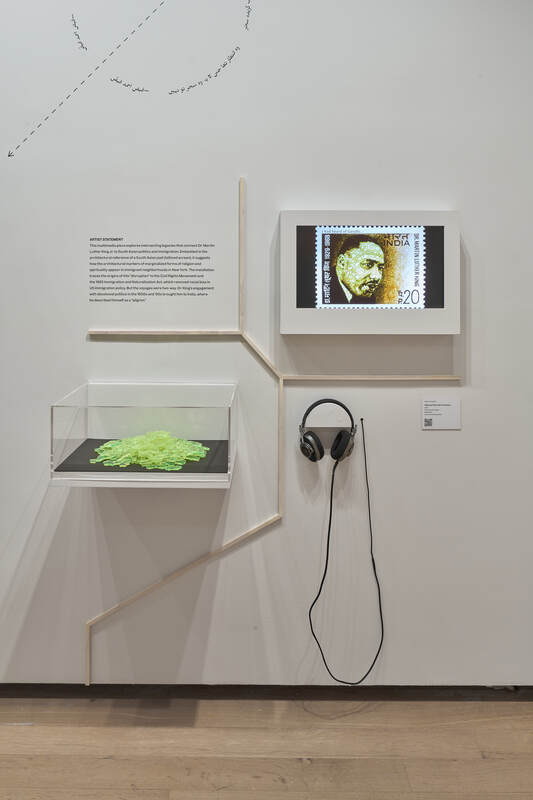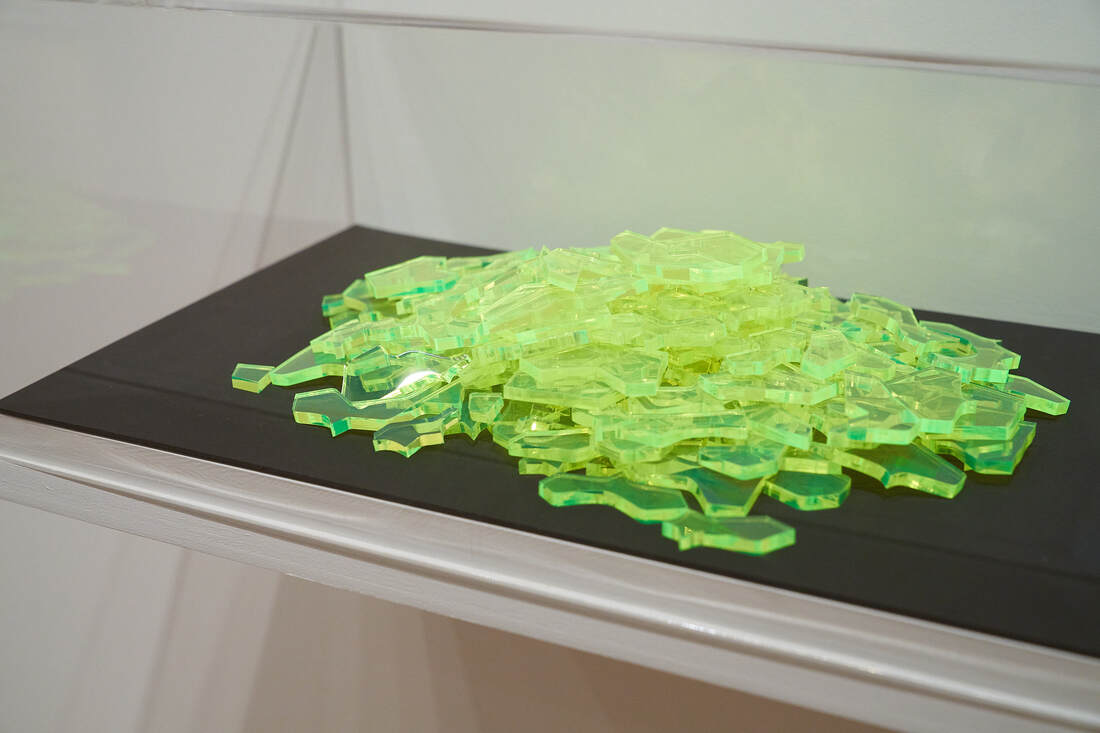Pilgrims/This Is Not That Dawn, 2022
video and sculpture installation, 08:44
Commissioned by the Museum of the City of New York for City of Faith: Religion, Activism and Urban Space, curated by Dr. Azra Dawood.
This project considers the intersecting legacies that connect Dr. Martin Luther King Jr. to South Asian politics and immigration. Embedded in the architectural reference of a South Asian jaali, it suggests how the architectural markers of marginalized forms of religion and spirituality appear in immigrant neighborhoods in New York. The installation traces the origins of this “disruption” to the Civil Rights Movement and the 1965 Immigration and Naturalization Act, which removed racial bias in US immigration policy. But the voyages were two-way. Dr. King’s engagement with anti-colonial politics in the 1950s and 60s brought him to India, where he described himself as a “pilgrim.”
In recognition of the decades-long engagement between US civil rights activists and the Indian anti-colonial movement, the postcolonial government of India posthumously awarded Dr King the Nehru Award for International Understanding in 1969, which was collected by Coretta Scott King in Delhi. The commemorative postage stamp pictured in this project was issued to coincide with the award, and Coretta Scott King’s visit to Delhi.
Pilgrims/This Is Not That Dawn traces the conflicting histories of these exchanges with the casteism and anti-Blackness in Gandhi’s politics, and in South Asian communities more widely. It features audio from Faiz Ahmed Faiz, Dr. Martin Luther King, Jr., Martin Luther King III, Dr. B.R. Ambedkar, Hasan Minhaj, Femi Oke and Malika Bilal.
This project considers the intersecting legacies that connect Dr. Martin Luther King Jr. to South Asian politics and immigration. Embedded in the architectural reference of a South Asian jaali, it suggests how the architectural markers of marginalized forms of religion and spirituality appear in immigrant neighborhoods in New York. The installation traces the origins of this “disruption” to the Civil Rights Movement and the 1965 Immigration and Naturalization Act, which removed racial bias in US immigration policy. But the voyages were two-way. Dr. King’s engagement with anti-colonial politics in the 1950s and 60s brought him to India, where he described himself as a “pilgrim.”
In recognition of the decades-long engagement between US civil rights activists and the Indian anti-colonial movement, the postcolonial government of India posthumously awarded Dr King the Nehru Award for International Understanding in 1969, which was collected by Coretta Scott King in Delhi. The commemorative postage stamp pictured in this project was issued to coincide with the award, and Coretta Scott King’s visit to Delhi.
Pilgrims/This Is Not That Dawn traces the conflicting histories of these exchanges with the casteism and anti-Blackness in Gandhi’s politics, and in South Asian communities more widely. It features audio from Faiz Ahmed Faiz, Dr. Martin Luther King, Jr., Martin Luther King III, Dr. B.R. Ambedkar, Hasan Minhaj, Femi Oke and Malika Bilal.
List of Sources
Dr. B.R. Ambedkar interviewed by the BBC, 1955
Dr. Martin Luther King, Jr. interviewed by Martin Agronsky for Look Here, NBC, 1957 - Dr. Martin Luther King, Jr. postage stamp, India Post, 1969
Farewell Statement for All India Radio, Dr. Martin Luther King, Jr., All India Radio, Prasar Bharti Archives, 1959, published online 2021
Martin Luther King – Untouchables in India and America, Los Angeles World Affairs Council & Town Hall, 1965, published online 2015
Martin Luther King III commemorates his father's visit to India 50 years back, AP Archive, 2009, published online 2015
Racism against Africans in India, The Stream, Al Jazeera English, 2017
Subh-e-Azadi, Faiz Ahmed Faiz, 1947, audio published online by Brown Verses, 2022. Translation from Urdu to English adapted by the artist from Love and Revolution: Faiz Ahmed Faiz – The Authorised Biography, Ali Madeeh Hashmi, Rupa, 2016
We Cannot Stay Silent About George Floyd, Patriot Act Digital Exclusive, Netflix, 2020
Was Mahatma Gandhi racist?, The Stream, Al Jazeera English, 2018
Dr. B.R. Ambedkar interviewed by the BBC, 1955
Dr. Martin Luther King, Jr. interviewed by Martin Agronsky for Look Here, NBC, 1957 - Dr. Martin Luther King, Jr. postage stamp, India Post, 1969
Farewell Statement for All India Radio, Dr. Martin Luther King, Jr., All India Radio, Prasar Bharti Archives, 1959, published online 2021
Martin Luther King – Untouchables in India and America, Los Angeles World Affairs Council & Town Hall, 1965, published online 2015
Martin Luther King III commemorates his father's visit to India 50 years back, AP Archive, 2009, published online 2015
Racism against Africans in India, The Stream, Al Jazeera English, 2017
Subh-e-Azadi, Faiz Ahmed Faiz, 1947, audio published online by Brown Verses, 2022. Translation from Urdu to English adapted by the artist from Love and Revolution: Faiz Ahmed Faiz – The Authorised Biography, Ali Madeeh Hashmi, Rupa, 2016
We Cannot Stay Silent About George Floyd, Patriot Act Digital Exclusive, Netflix, 2020
Was Mahatma Gandhi racist?, The Stream, Al Jazeera English, 2018



